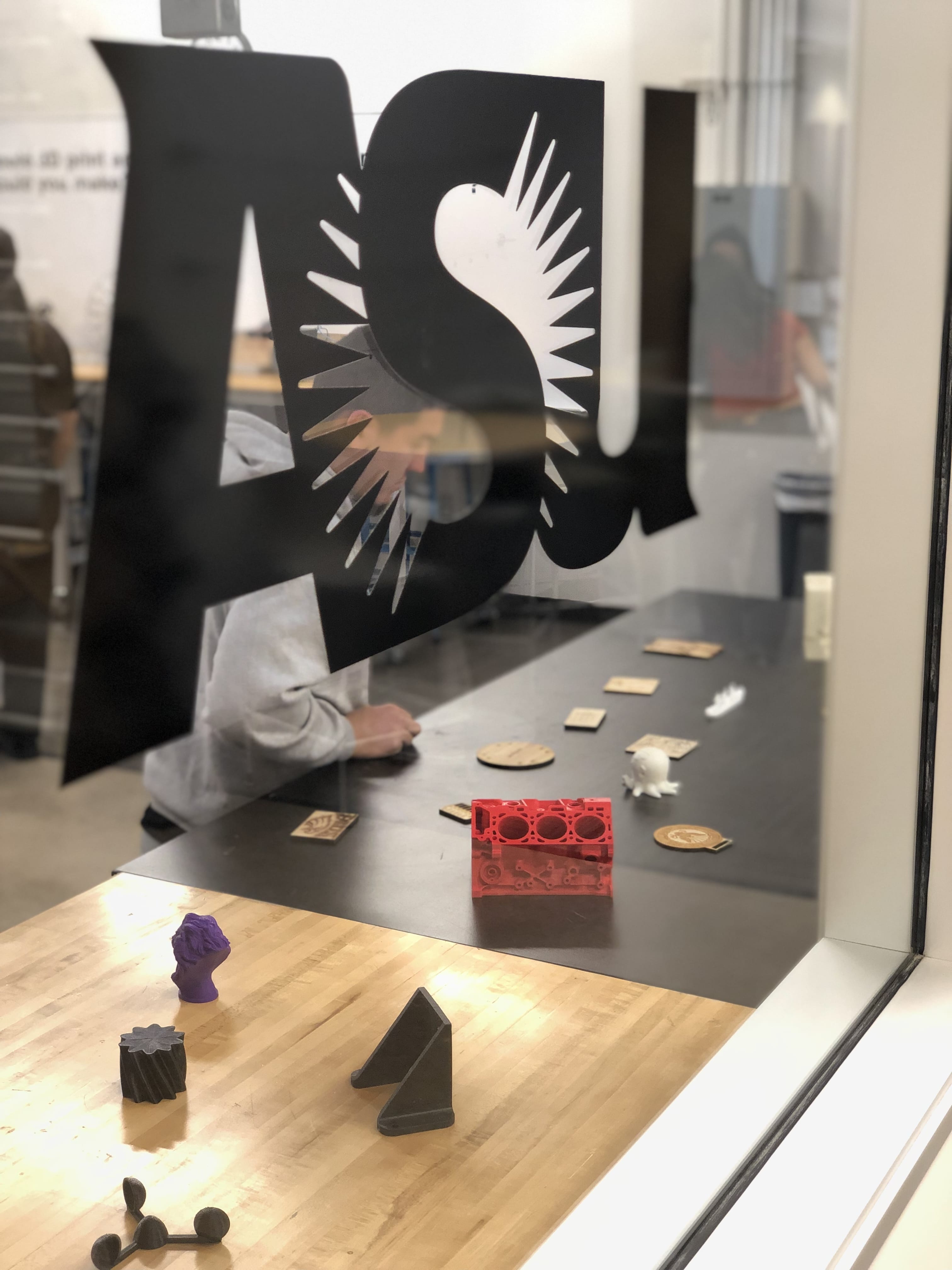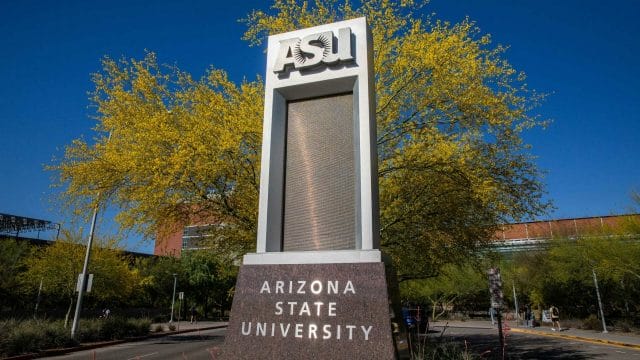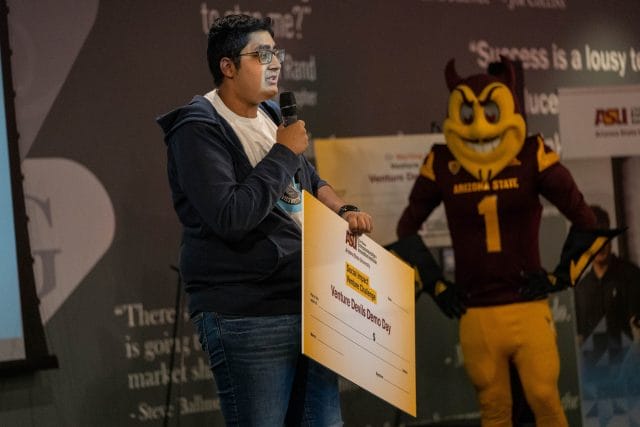Imagine a space where students, entrepreneurs, retirees, cosplayers and gamers come together to socialize on a Friday night, setting aside clear differences in age, career interests and educational background and choosing instead to focus on what each can learn from the other. The topic of conversation centers not only on the highest quality craft beer or the latest Marvel movie to hit the screens, but also on the unique capabilities of a laser etcher or Computer Numerical Control (CNC) machinery for enhancing the creative process.
For several years, Arizona State University has been working to cultivate such an environment at the ASU Chandler Innovation Center (ACIC), and the vision is closer to becoming a reality. The ACIC Makerspace will offer membership-based access to a vast collection of DIY tools and resources that would otherwise be difficult or impossible for the average person to use.
University leaders say they are excited for the full opening and for the opportunity to encourage people of all ages and backgrounds to pursue their creative impulses and to become not just dreamers but learners, makers and collaborators.
Work space + play space = makerspace
In keeping with the core tenets of the maker movement, the ACIC Makerspace is designed to provide users with the tools they need to get a job done as well as the knowledge and confidence necessary to do it well. A big part of it’s success rests on the people who come through its doors, and ASU leadership is committed to attracting a broad range of members.
“We want this to be a place for people to learn and socialize around the concept of making,” said Ji Mi Choi, associate vice president for Entrepreneurship and Innovation at ASU’s Knowledge Enterprise. “When we include and attract a diverse set of users ranging from students to business owners, artists and people from all walks of life, then we know we will be successful.”
Project manager Chris Wilkes, who works full time at the ACIC Makerspace, agrees.
Wilkes said. “It’s the networking that happens between members. People come down here after work and instead of going to the bar, or sitting on the couch watching TV, they come here and hang out. It is great because you have engineers, fabricators, machinists and upholsterers. You know, retirees, students, people in the middle of their career; you mix all of that diversity of age and background and skill level, and that’s where innovation really happens.”
Overcoming early hurdles
ACIC’s presence in Chandler has filled a clear void for entrepreneurs and community members wanting to advance their businesses and hobbies, but its path to success has not always been smooth. ASU leadership has worked diligently to ensure that the makerspace not only meets users’ expectations, but fully reflects the university’s charter, which is centered on access, inclusion and social embeddedness.
The makerspace originally opened in 2013 under the management of San Jose-based TechShop — a company whose mission was to empower inventors, hobbyists and entrepreneurs to be successful by eliminating the need to purchase cost-prohibitive equipment and tools. In addition to the Chandler space, TechShop opened nine other locations in cities across the country including San Francisco, Chicago, Detroit, St. Louis and the District of Columbia.
TechShop’s unexpected closure in November 2017 and subsequent bankruptcy declaration in February 2018 caught many off guard, including local members and ASU, which had invested over $1 million in the partnership in addition to much more in the building itself.
Chandler Mayor Kevin Hartke said he heard from many community members who had come to depend on the makerspace for resources that would otherwise have remained out of reach. “We definitely received a lot of negative feedback with the closing [of TechShop],” he said.
ASU leadership felt an immediate responsibility to keep the makerspace open and available, though it would take months to work through legal proceedings to acquire existing equipment from the bankrupt TechShop. In the interim, the university continued to host community events and startups at ACIC, including through the city of Chandler’s startup support program – Chandler Innovations.
An announcement came in January 2018 that the makerspace would reopen as part of the East Valley Entrepreneur Week events. A well-attended open house on Feb. 20 revealed the newly revamped makerspace. So far, the response from the community has been positive.
“People are looking forward to having something there again and being able to use the resources that are available,” Hartke said.
The ASU team and community partners are excited for what the future holds and confident in the revitalized long-term vision for the space, now known simply as the ACIC Makerspace.
New management, new vision
The ACIC Makerspace’s new management model builds on past successes at ASU. The highly experienced Entrepreneurship and Innovation (E+I) team will manage all front office aspects of the makerspace, including events coordination and promotion, while the ASU Core Research Facilities Instrument Design and Fabrication (IDF) unit will operate the makerspace itself in partnership with E+I. IDF has an established history of providing electronics, glassblowing and machining equipment and services to ASU units and affiliates.
“We’re excited for this ASU partnership and for its potential to serve the community at large,” said Choi. “It offers both stability and flexibility, and really expands the range of possibility in terms of programming that we are able offer in the space.”
The change in management has prompted a significant overhaul of safety features in the 13,000-square-foot space and some upgrades to equipment and software. IDF Operations Manager Brian Ipema said crews have updated ventilation systems, dust collection and more in order to provide a safer and more comfortable working environment.
Ipema noted that improvements are not just oriented toward improved safety but also on what new features members might want to see in the future.
“We want input on what people like, and what they would like to see so we can put those on the list of things we have to offer,” he said.
Wilkes stated that while TechShop had exclusive licenses with companies such as Autodesk that prohibited the use of other programs, ASU can provide more versatile industry-standard programs like SolidWorks for three-dimensional design and engineering.
Timeline and pricing
E+I leadership is working on a day-to-day basis toward a full opening date, and Ipema is confident that it will come soon. In the interim, he is bringing in inspection crews to ensure that all areas are up to code and ready to operate.
It’s likely the central hall with 3D printers, vinyl cutters and an electronics station will open first, and other areas will follow as approvals are finalized.
Until the pricing structure is finalized, memberships will be offered at no cost to the customer on a free trial basis. Once costs are determined, those who purchased membership through TechShop will not be able to carry over their subscriptions.
“Unfortunately, what was TechShop’s goes with TechShop,” Wilkes said. “But we [at ASU] are doing everything we can to make this right and make it work for everyone.”
As an added benefit, Wilkes and Ipema say that workshops will be available in the future on a range of topics related to tool and equipment use and maximization of the value of the space.
“Right now the makerspace is focusing on basic training, fire safety, lab safety, and general safety,” Wilkes said, “As we continue to become more operational there will be basic use instruction as well as workshops designed to help build members’ understanding of what you can do with these tools and how the machines tie together.”
Mayor Hartke is enthusiastic about the center’s future as a key ASU initiative. “It’s a great resource and it represents a great partnership with ASU that allows maker folks and entrepreneurs to flesh out ideas and work hand in hand with the innovation space to spin out businesses in our community,” he said.
To see a full list of current ACIC inventory go to: https://entrepreneurship.asu.edu/sites/default/files/uploads/ACICListofInventory.pdf
To learn more about the ASU Chandler Innovation Center (ACIC) go to: https://entrepreneurship.asu.edu/asu-chandler-innovation-center-acic


